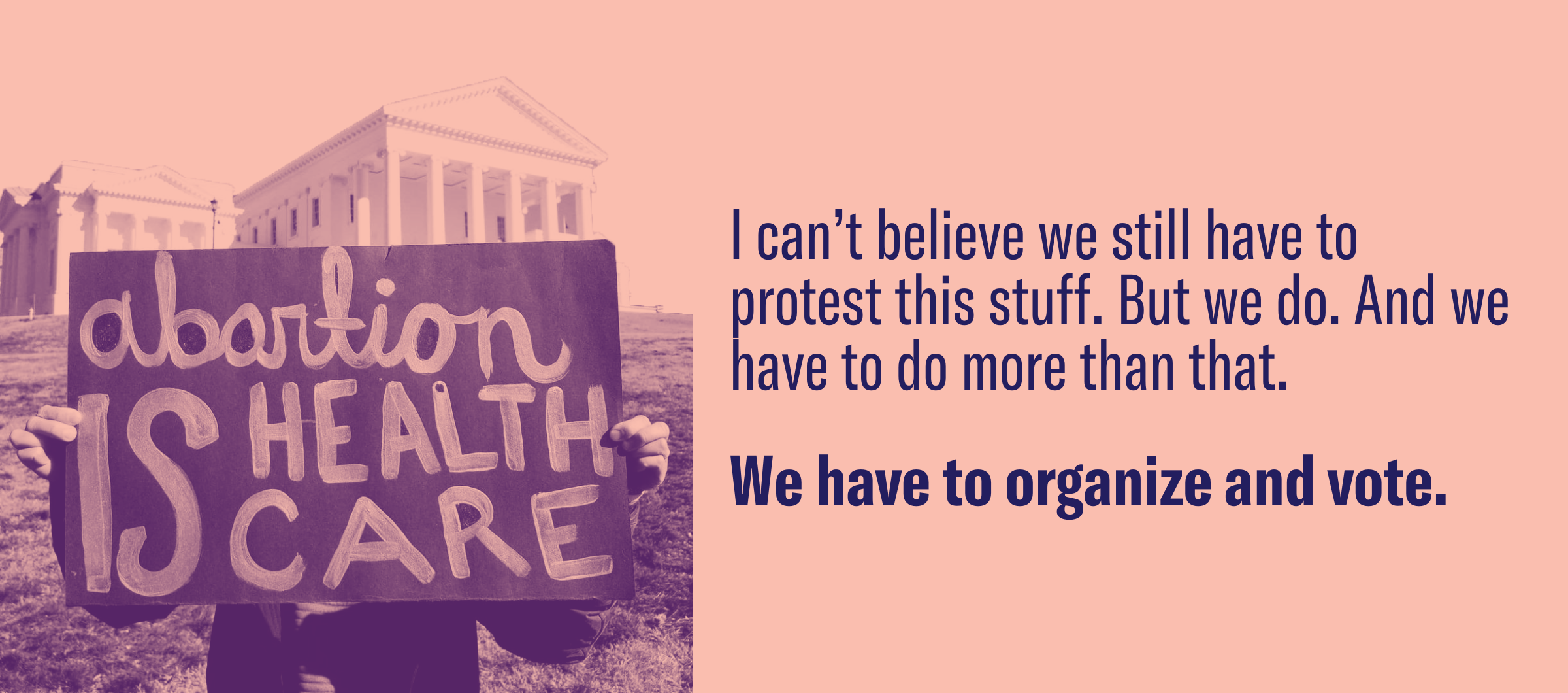One of my favorite posters from recent womens’ rights marches is the one that reads: “I can’t believe I still have to protest this [stuff].” (Of course, the sign used a different word than “stuff.”) But the point is correct: The right to make fundamental decisions about one’s reproductive health was recognized as a constitutional right in Roe v. Wade in 1973, almost 50 years ago. And yet, abortion rights are in greater peril now than they have been at any time in the last 48 years. I can’t believe we still have to protest this stuff. But we do. And we have to do more than that. We have to organize and vote.
Make sure you're prepared to vote!
Close to one in four women in the United States will have an abortion in her life. And that means that, almost certainly, someone you know and love has made the decision to terminate a pregnancy. Abortion is a low-risk, incredibly safe medical procedure. In short, it is healthcare. Where abortion is illegal, women’s health suffers, and women die. Researchers from the Center for Disease Control examined national abortion data from the three years surrounding the ruling in Roe and estimated that the number of illegal procedures in the country plummeted from 130,000 to 17,000 between 1972 and 1974. In Brazil, where abortion is illegal today, it’s estimated that 250, 000 women are hospitalized from complications from abortions, and about 200 women a year die from those complications.
The seven-to-two U.S. Supreme Court decision in Roe declared unconstitutional a Texas criminal statute that made procuring or attempting an abortion illegal, except on medical advice for the purpose of saving the mother's life. In 2021, Texas once again led the nation in opposing reproductive rights by passing SB 8. SB 8 allows any private citizen in Texas, or elsewhere, to sue anyone who performs an abortion in the state after an embryo’s cardiac activity can be detected (generally around six weeks, when the embryo is the size of a grain of rice). It also allows any private citizen to sue anyone (in Texas or elsewhere) who “aids or abets” anyone in getting an abortion in Texas after that period or anyone who intends to aid or abet that process.
The U.S. Supreme Court recently allowed Texas’ extreme anti-abortion law to take effect, and thus abortion is now impossible to obtain for most women in Texas. The Supreme Court is also scheduled to hear arguments on December 1 on a Mississippi law that bans most abortions after 15 weeks, significantly before fetal viability. A panel of the 5th U.S. Circuit Court of Appeals, one of the most conservative in the country, blocked enforcement of the law, finding it in conflict with Roe v. Wade and subsequent abortion decisions. But, given the current composition of the Court, the right of individuals to make healthcare decisions for themselves is very much in danger.
If Roe v. Wade is overturned, and there is good reason to fear it could be, abortion will become inaccessible for women in many states. Twenty-two states have laws on the books that would outright ban or severely limit access to abortion. On the other side, 14 states have passed laws that would explicitly protect the right to abortion.
Currently, Virginia is in neither of these categories. Thus, if Roe is overturned or significantly weakened, Virginians will likely continue to have access to abortion in the short term. However, the right to abortion will not be codified in law. And that puts women’s lives in danger.
Because all Republican senators and one Democratic senator currently oppose abortion rights, the outcome of a bill to protect abortion rights is uncertain in an almost equally divided Senate. In recent days, I heard someone very knowledgeable about our legislature utter these terrifying words: "Virginia is one vote away from being Texas." While that may be hyperbole, it's closer to the truth than any of us should feel comfortable with.
So yes, Virginia should pass a law protecting people’s right to access the health care they need and deserve. The ACLU of Virginia will be there to insist that it does. But the chance of such a bill succeeding depends on one thing: whether people get out to vote for pro-choice candidates in this important election. You’ve heard it before, and we’ll say it again: Elections matter. Your life, or the life of someone you love, depends on this one. Please vote.


